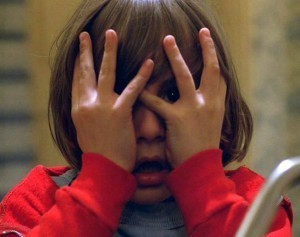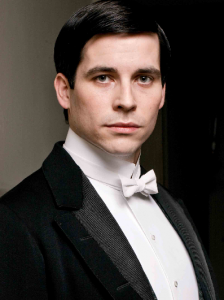Tropes on the ropes: things I avoid

How I often feel about today's horror movies.
When I was a kid–and my kid-hood stretched well into my twenties–nothing in the horror genre bothered me. Some things made deep impressions, of course (the climax of Night of the Living Dead, for example, introduced me to nihilism), but it didn't trouble me or give me the kind of nightmares that make you swear off things. And I was up for anything, from the various Friday the 13th slasher murders to the lascivious decapitated head in Re-Animator. My absolute favorite horror film, Dawn of the Dead, remains one of the genre's goriest even now.
I'm not sure when that changed, or why. I only know it has. There are simply some emotions I have no desire to feel, especially in my "entertainment." I won't read or watch anything that I know includes them, and I'll turn something off or close the book if I encounter them with no warning. And I'm wondering if it's just me getting wimpy in my middle age, or if other people also experience this.
Not all of them are inexplicable, though. A big one for me is anything that focuses on the terror, pain or deaths of children. The source of that is easy, and I can hear it banging around downstairs as I write this. I've heard from other parents that that they've experienced something similar, so I know I'm not alone. It's a visceral, emotional response that I simply don't want to feel. I still get queasy thinking about a scene from American Horror Story where a doctor was sewing pieces of his dead baby together. If it makes me a wimp, then, I can accept that.

This year's model of the smug, petty villain.
A much more personal thing is the handsome, smug, petty villain. This one is new, and has manifested only in the past ten years or so. Watching Downton Abbey with my wife, I was totally unprepared for my reaction to Thomas the scheming footman: absolute, full-on rage. And while I understand that I'm putting his face on people from my own past, and that the rage is really directed at them and not the character, it doesn't help me "enjoy" the show. In fact, it sort of makes me dread watching it, much as I'd dread running into those same people. It's also kept me from enjoying many ostensible comedies, which often feature this sort of character as the main bad guy.
Getting back to horror, I also don't enjoy lingering shots of people in pain, which means I avoid the whole "torture porn" subgenre. The horror films I grew up with may have featured high body counts and outlandishly gory death scenes, but they didn't include lingering, almost pornographic shots of people (usually women) in agony. This started, in my view, with Wes Craven, whose cleverness goes hand-in-hand with his sadism, and became a genre of its own with the first Saw. Whenever I see one of these films advertised, I picture a bunch of twenty-something young men in a film editing room, drinking, farting and laughing hysterically at their own cleverness. It's the frat boy approach to horror, and as an adult, I have no interest in exposing myself to any more of it. (Whether horror even counts as an "adult" genre is something I've long pondered, and still haven't resolved for myself.) I'm also reminded of something Mike Nelson wrote:
"[It] makes one wonder how, with movie making being such a formidable task, requiring so much drive and vision, how could an individual choose to put so much ugliness on screen?"
I also don't enjoy creators who get readers/audiences emotionally attached to characters they plan to capriciously kill off. It's one reason I've avoided, and plan to continue avoiding, A Game of Thrones. It's not really a criticism, since this doesn't bother most readers and viewers, and of course drama must be able to include death. But I've lost enough real people in my life that I simply get no pleasure from losing fictional ones due to a creator's arbitrary decisions. And honestly, I feel this sort of thing violates an unspoken contract between creator and consumer. Real life is capricious enough; one reason I like fiction is the security of knowing that events will make sense. When they don't, at some level I feel betrayed.
I get less visceral reactions to some of the trite and obvious (not to mention unrealistic) tropes in more general forms of entertainment: the fat schlubby guy who wins the hot girl, sex scenes where the actress keeps her bra on, the whole Manic Pixie Dream Girl concept, the idea that immaturity is something to be treasured, and so forth. Part of it is simply that, as a writer, I recognize how false these concepts are. The rest is weariness: have you got nothing new?
And now, I'm asking you. What tropes/plot points/thematic elements do you deliberately avoid, and why? Leave a comment and you'll be entered to win a copy of the Burn Me Deadly paperback, which includes a sneak peek of Wake of the Bloody Angel.



